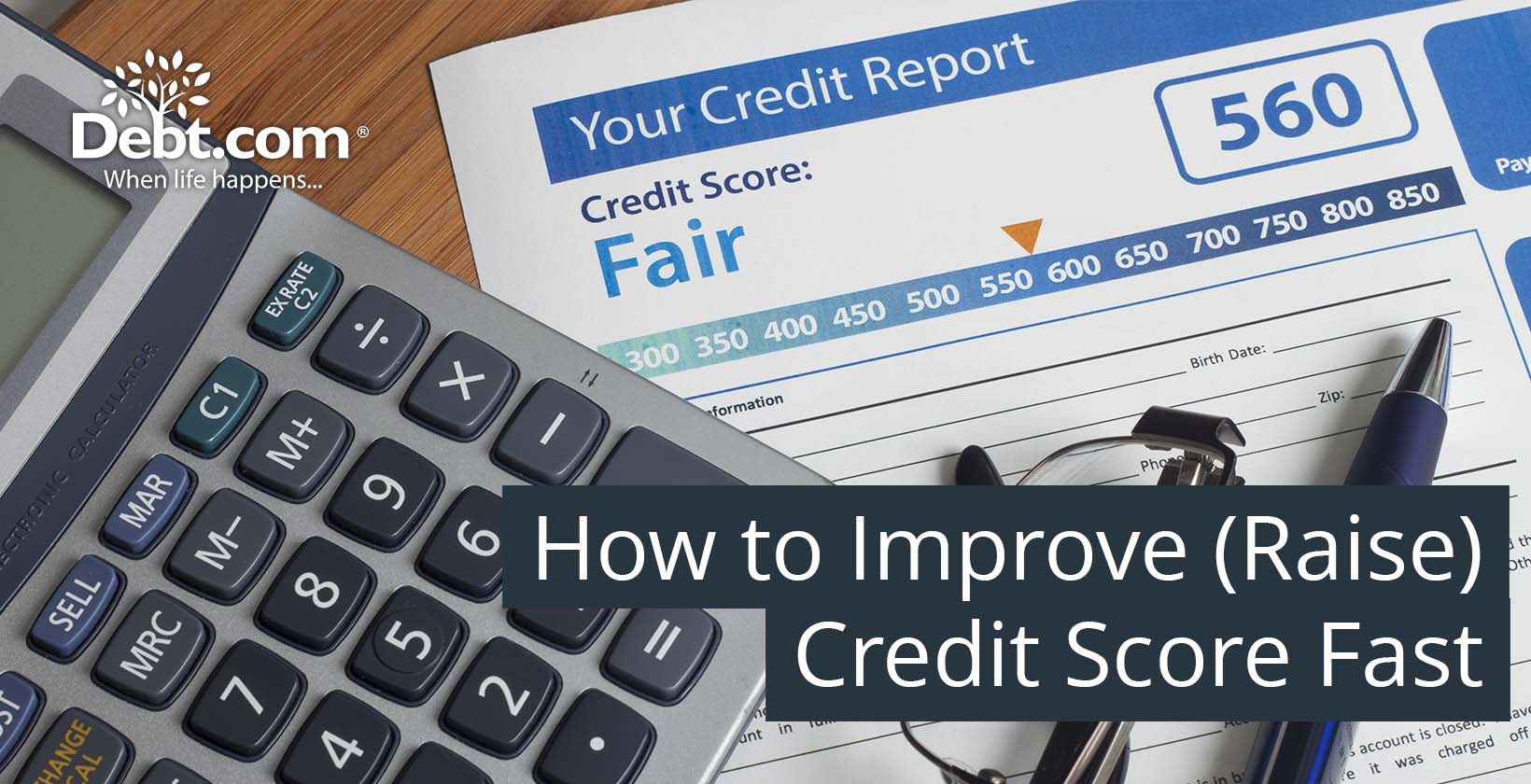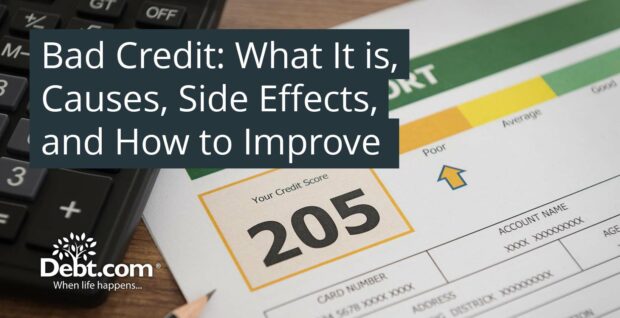
To improve a credit score fast, take steps and manage finances diligently. A credit score is a metric that lenders use to determine the probability of timely loan repayment based on the information in a credit record. Debtors must boost their credit scores for better interest rates and loan terms. Disputing invalid items in credit reports improves credit scores quickly. Timely payment of credit card obligations is vital as payment history constitutes a substantial credit score component. Preventing the overuse of credit applications and augmenting credit card limits favors the credit score to improve utilization ratios. Effective strategies include cash-only budgeting and consolidating credit card debts with a consolidation loan. These actions enhance the debtor’s credit score, maintain active older bank accounts, and become an authorized credit card user with a positive payment history. Timely repayment of collection accounts mitigates their adverse impact on one’s credit score.
Implementing these strategies collectively results in an improvement in a borrower’s credit score within a short period. Borrowers improve their credit standing by addressing payment history, credit utilization, and account age, all aspects of credit management. Maintain disciplined financial habits and regularly review one’s credit report to track progress and identify areas for further improvement. Spending within one’s means aids in building a better credit score.
Table of Contents
Dispute Invalid Items in Credit Report
Dispute invalid items in a credit report that influence a credit score. Invalid items are information in a credit report that is inaccurate, misleading, or outdated. Examples of “invalid items” include incorrect balances, outdated account statuses, and multiple entries for the same account. Examine the credit reports and contest any negative or inaccurate entries discovered.
Creditors have a thirty-day window to verify debt with the credit bureau; otherwise, the entry must be removed. There are mistakes in borrower’s credit reports most of the time. An annual credit report from each of the three main credit bureaus is free to consumers per federal law. TransUnion, Experian, and Equifax are three major bureaus where individuals must request a free copy of their credit report.
There is no impact on one’s credit when they dispute credit inquiries. Certain adjustments in response to disputes improve a borrower’s credit score. Correcting erroneous late payments, new credit inquiries, or bankruptcies enhances credit scores. Credit scores are not impacted when personal data, including name, address, or employer, is revised.
Pay Credit Card Debts on Time
Paying credit card debts on time is crucial to creating a better credit score. Payment history is the most important part of one’s credit score, determining 35% of an individual’s credit score. Credit card debts are the outstanding balances that individuals owe to credit card issuers for transactions made using a credit card, such as purchases, balance transfers, and cash advances. Cardholders accrue these debts when they fail to complete payments on their credit card statements by the designated due date, incurring interest charges and potentially additional fees.
Setting up automatic payments for the minimum amount on one’s debts is a good practice to avoid missing one. Paying all credit card debts on time avoids paying penalties, late charges, and negative marks on a credit score. The negative impact of a missed payment on credit lasts for seven years. Practice a disciplined payment scheme with all credit card debt and never miss payments. Write down all purchases made so as not to forget anything, and be wise when swiping one’s card. Having a credit card is so tempting that people sometimes overspend beyond their means.
Avoid Applying for Unnecessary Credits
Avoid applying for unnecessary credits to keep one’s credit utilization ratio low. The amount tells one how much credit they use compared to their available credit. Credit scoring models see a smaller ratio as better, which raises one’s credit score. One’s credit score goes down three or five points with each application. The effect does not last forever but determines whether a borrower gets clearance. A hard inquiry remains on one’s credit record for two years. Their impact on one’s credit is temporary, lasting just a year. Having fewer debts is easier to manage and maintain. Keeping track of all credits is easier because there are fewer accounts to monitor.
Increase Credit Card Limit for Better Credit Utilization Ratio
Increase credit card limits for a better credit utilization ratio and boost a credit score. Banks recognize responsible behavior by approving an increase in someone’s credit limit when they manage it effectively. The increase extends one’s financial flexibility and has the added benefit of lowering a credit utilization ratio, positively affecting one’s credit score. A credit utilization ratio measures how much a borrower’s available credit they are using. Requesting a higher credit limit leads to either a hard or soft inquiry from a bank, depending on their policies. Hard inquiries temporarily decrease one’s credit score, whereas soft inquiries don’t. Knowing the type of inquiry a bank uses helps debtors strategically manage their credit.
The credit card utilization ratio is important for credit scores because it is part of many credit scoring models. It is ranked as the second most important feature after payment history. Lenders identify how well a borrower handles their money by looking at the number, which compares how much credit they use to how much they have available. The ratio shows how well debtors manage their ongoing debts. Lenders pay close attention to the ratio because it shows how well debtors manage borrowed money and pay back bills on time.
A high utilization ratio occurs when several credit cards are maxed out. It tells lenders that a person puts too much on their credit cards and is unlikely to meet their repayment responsibilities. Maxing out all credit cards makes lenders doubt their ability to keep their financial promises, so they don’t want to give debtors more credit for fear of losing money. A low credit utilization ratio shows that reliable borrowers handle one’s money well. Having such a credit history indicates that a person is not dependent on credit too much and is capable of repaying any extra money borrowed on time. Keeping one’s credit card utilization ratio low improves the credit score and enhances one’s credibility with lenders, which leads to better loan chances and terms.
Consolidate Credit Card Debts with a Consolidation Loan
Consolidate credit card debts with a consolidation loan to reduce the credit utilization ratio. Use the loan money to pay all credit card balances, but do not close the account. Avoid using credit cards as much as possible, start spending using cash only, and be debt-free after the loan period. Doing so improves one’s credit score in various ways.
Apply for debt consolidation loans with favorable terms and competitive rates. Debt consolidation is the process of taking out a single new loan to pay off multiple current debts. Be determined to make regular payments based on the agreed-upon repayment schedule. Paying off credit card balances reduces utilization to 0%, and keeping cards available ensures a low utilization ratio in an emergency. Make all loan payments on time to build a payment history. Keep all accounts open to maintain the highest average credit age.
Consider a Cash-only Budget
Consider a cash-only budget and manage one’s finances wisely. A cash-only budget enables borrowers to stay out of debt. The process prevents debt and lets people use extra cash to pay off their balances. A borrower’s utilization ratio decreases, and their credit score increases when they pay off the sums owed to credit cards. The interest imposed by the card issuers is reduced when the balance is smaller, meaning they have more money available to pay off their debt.
Become an Authorized Credit Card User for a Credit Card with a Positive Payment History
Become an authorized credit card user for a credit card with a positive payment history. Most credit cards enable cardholders to include authorized users in their accounts. Adding a newly approved user doesn’t cost anything most of the time. Some cards impose a fee every year. Adding oneself as an approved user to a card that has been open for a while, has a good payment history, and has been used helps one’s credit score. A person who is allowed to utilize the account is not the owner of it. They buy things with the card but are not legally required to pay for them. Most banks do not do a hard credit pull before adding a newly approved user, but be careful whose credit card one is added to. Adding it to one’s list hurts their credit score if they have a record of late payments, high balances, or other problems with that card.
Close Newer Bank and Credit Accounts
Closing newer bank and credit accounts has no negative impact on one’s credit score. Closing bank accounts is not disclosed to major credit bureaus. A credit score is determined by how a debtor manages lent money. Savings and checking accounts are not debts. A negative balance when the account is terminated damages one’s credit score.
A bank or credit union charges one and covers the transaction if they withdraw too much money. A bank sends it to a collection agency if they don’t pay the transaction and fee. The service notifies all three credit bureaus of the account. A collection account on a credit report lowers a borrower’s score and lasts on the report for 7 years.
Keep Oldest Bank Accounts Open
Keep the oldest bank accounts open to maintain a positive credit history. The age of one’s accounts determines their credit score. A long credit history shows lenders that they’ve been responsible with their credit. The average age of one’s accounts is likely to decrease, which hurts one’s credit score if one closes their oldest bank accounts. Another important factor is account age. Fifteen percent of a credit score is based on how well a debtor keeps an account open for a long time. Keep the older accounts open for maximum benefit. Ensure that the bank account is in good standing before closing it, having a negative balance negatively affects one’s credit.
Avoid Closing Old Credit Cards
Avoid closing old credit cards not to lose credit limits and increase one’s utilization rate. Lenders view an elevated utilization rate as an indication of risk, as it signifies that a significant portion of one’s credit is being utilized. Another critical reason to consider not to close an old credit card is the decrease in the average age of an account. There are ways to avoid closing old credit cards, such as requesting a retention offer, removing annual fees, and requesting a lower interest rate. Banks grant such requests to people with good credit histories.
Pay off Collection Accounts
Pay off collection accounts to prevent them from hurting one’s credit score. Collection accounts are debts sold to a third party or a debt collection agency to acquire outstanding debts for another company. Debts accumulated over a few months have had their accounts transferred to a collections agency for a nominal fee. The collection agency service gets in touch with the debtor to make payments.
A credit record shows a negative entry for late payments in the past 30 days. A late payment appears on one’s credit report for seven years. Each incident lowers a credit score because a debtor’s payment history accounts for 35% of their overall score. A debt sent to a collection account shows up on one’s credit record as a separate account. The debtor’s account is flagged as being in a collection when the bill is sent to collections. Creditors see their credit score drop by a different number of points, but for most people, it drops by several hundred or more. These posts have less effect over time, notably if the debtor starts good money habits.
How to Build Your Credit Score for Free?
To build your credit score for free, follow the steps listed below.
- Get approved for a secured credit card. Apply for a secured credit card, which is easier to approve if someone has a poor or non-existent credit history. Make a security deposit on a secured card, typically starting at $200, which becomes one’s credit limit. Responsible use of a secured card helps establish good credit.
- Be an authorized user. Become an authorized user on a family member’s or friend’s credit card. Doing so lets one piggyback off their positive credit history and build their credit. Be sure that both partners are aware of the responsibilities involved.
- Get points for paying bills on time. On-time payments for these bills positively impact one’s credit score, with some users seeing an average increase of 13 points.
- Get a credit-builder loan. Consider opening a credit-builder loan, which demonstrates one’s ability to make consistent, on-time payments. The funds are deposited into a savings account, or CD with a credit-builder loan, and borrowers access them once the loan is paid in full.
- Monitor personal credit utilization. One’s credit utilization rate is the percentage of the total available credit one uses. Aim to keep the utilization rate below 30%, with consumers with excellent credit typically having a rate below 10%.
- Pay off small purchases quickly. Start building a credit history by making small purchases on a credit card and paying them off promptly. On-time payments, no matter how small, positively impact one’s credit score.
How Long Does It Take to Raise Credit Score
Several factors affect how long it takes to raise a credit score. A credit score is a number that represents a borrower’s creditworthiness. Significant components of one’s repair timeline include one current standing, the initial cause of one’s low score, and their financial habits. However, an exact formula for determining the repair timeline does not exist. FICO (Fair Isaac Corporation) has information that helps determine how long it takes to get one’s score back to where it was before a person had a financial problem. The data shows how long it takes for people with bad to good credit to get their credit back.
The recovery time for credit scores varies depending on the financial event. Credit scores take over six years to return to normal after bankruptcy. Foreclosed get back on their feet in three years, but payments that are missed or not made at all take about 18 months. Late mortgage payments usually take about nine months to restore one’s credit score. Closing a credit card account, maxing out a credit card, or registering for a new credit card usually have less effect, and it takes about three months to get back to normal.
What are the Misunderstandings for Getting a Credit Score Up?
There are various misunderstandings about getting a credit score up. There are numerous misconceptions regarding what affects a healthy credit score, which is crucial to one’s finances. One misconception about increasing a credit score is that carrying a balance on a credit card boosts a credit score. A credit card balance does not improve one’s credit score. It poses a risk of damage and ultimately results in increased interest expenses, which are costly to repay. Paying interest on a credit card balance is financially unnecessary if one reimburses the balance monthly. Long-term credit card debt affects usage. A credit card balance raises the utilization rate and affects a credit score.
Another misconception about getting a high credit score is one’s salary and income. Salary and income indicate a person’s ability to meet financial obligations rather than determining their creditworthiness. Income does not appear on credit reports or affect a credit score. Credit scoring models do not consider metrics related to wealth. Factors such as payment history, amounts owed (utilization rate), length of credit history, new credit (frequency of applying for and opening new accounts), and credit mix (variety of credit products) are the key variables that impact a person’s credit score.
Checking one’s credit score is among the common misconceptions about credit scores. Keeping track of a credit score is a great way to track how credit-building is going, but one must do so correctly to ensure progress is being made.
Marriage merges credit score with spouses is one big misunderstanding of how a credit score works. A person’s credit data remains unique in each individual when they get married. Every partner’s credit score is checked when they apply for new credit with their partner, like when they both apply for a mortgage.
Another popular misconception is that having a good credit score means a person is wealthy. Wealth doesn’t have something to do with how a person pays their bills on time. A credit score is a measure of a person’s credit risk.
People think their credit scores go up when they close a credit card. Closing a credit card to improve one’s credit score is a myth. Experts don’t recommend closing a credit card because it’s likely to lower one’s score. Consider certain factors before canceling a credit card. A card without an annual charge is fine to remain open. However, one must call the card issuer to request a no-annual-fee credit card if they lose money. Credit cards with high interest rates are best to close.
How to Learn FICO Score?
To learn your FICO (Fair Isaac Corporation) Score, there are 4 steps to follow. A FICO Score is a credit score established by the Fair Isaac Corporation (FICO). It is a tool most lenders use to identify whether a creditor qualifies for various loans.
First, check with the bank or credit union, as many participate in FICO’s Open Access Program, which provides customers with free info about their FICO Scores. Find an individual’s FICO Score readily available by logging into one’s account online. Second, call the credit card issuer if the bank or credit union doesn’t offer such a service. Many credit card issuers partner with FICO and provide customers access to their FICO Scores or VantageScore 3.0. Review the issuer’s terms and conditions to determine the availability of the service.
Third, the FICO Score is obtained through such a process if one considers taking out a loan, such as a mortgage or auto loan. Many dealerships and mortgage companies use FICO Scores in their lending decisions. Applying for a loan results in a hard inquiry on a credit report, temporarily lowering one’s credit score by a few points.
Monitoring one’s credit score, whether one’s FICO Score or another score like VantageScore 3.0®, is vital for maintaining financial health. Lastly, identify factors affecting credit and take steps to improve it, such as correcting errors on a credit report by regularly checking one’s score. Obtaining a FICO Score and monitoring it closely helps make informed financial decisions and work towards achieving one’s financial goals. Understanding the FICO meaning provides insights into one’s financial health and creditworthiness.
How to Understand Biggest Factor for Credit Score Calculation?
To understand the biggest factor for credit score calculation requires identifying the varied weights assigned to various credit factors by credit-scoring companies like FICO (Fair Isaac Corporation) and VantageScore. Payment history holds the majority weight, constituting 35% of the FICO score and 40% of the VantageScore, reflecting previous bill payment consistency. Credit utilization, comprising 30% of FICO and 20% of VantageScore, is closely followed by an assessment of the ratio of credit used to total available credit. The length of credit history, which constitutes 15%, evaluates account age and activity, while credit mix (10%) considers the diversity of credit types. New credit (10% FICO, 5% VantageScore) focuses on recent credit pursuits and inquiries.
The formula to calculate credit score involves summing the products of each factor’s weight and corresponding credit factor value, resulting in a score between 300 and 850. For example, an individual with a perfect payment history (35% weight) scores 35% * 850 = 297.5, greatly influencing their overall credit score.
What is the Relation between Interest Rate and Credit Score?
The relationship between interest rate and credit score is closely linked, with higher credit scores often leading to reduced interest rates. Lenders generally look at people’s credit scores when they ask for credit cards, loans, or mortgages. These numbers show how responsible the applicant is with money and how they’ve paid in the past. Lenders see people with better credit scores as less risky because they think the borrower is able to pay back their bills on time. People with better credit are often given cheaper interest rates because the lender takes less risk. People with lower credit scores are seen as more of a risk to lenders and are subject to greater interest rates to make up for it. It shows how important it is to keep one’s credit score high since it directly impacts how much it costs to borrow money and how easy it is to get good loan terms. Borrowers acquire of different types interest rates for their debts based on various factors such as their creditworthiness, loan type, prevailing market conditions, and the lender’s policies.
What are the Credit Bureaus to Take Support for Better Credit Score?
The credit bureaus to take support for better credit scores are TransUnion, Equifax, and Experian. All three credit bureaus gather the exact fundamental consumer report. It covers confidential data, including birthdate, Social Security number, name, and address. Additionally included is credit history, which comprises debts, payment records, and credit application activity. The Federal Fair Credit Reporting Act (FCRA) governs credit bureaus and specifies how they are permitted to acquire, distribute, and reveal consumer information. The bureaus depend on data provided by the financial institutions, retailers, banks, and occasionally landlords with whom one conducts business.
One credit bureau’s report on a credit differs from another because not all lenders report credit behavior to all three. Lenders’ information shows up on credit records at different times, even if they report to all three bureaus. Credit bureaus gather data at different times.
TransUnion is a Chicago-based company with a global presence established in the 1960s. It boasts regional offices in several countries, including Hong Kong, India, Canada, South Africa, Colombia, the United Kingdom, and Brazil. TransUnion’s geographic spread supports its operations as a leading player in the credit reporting industry.
Another major credit bureau is Experian. Experian has significantly expanded its operations, initially focusing on handling credit reports for the Western U.S. The company operates in 30 countries and has its corporate offices in Dublin, Ireland, while maintaining its domestic headquarters in Costa Mesa, California.
Equifax has headquarters in Atlanta and about 14,000 workers in 24 countries. It is a big player in the Southern and Midwestern parts of the United States and is regarded as the market leader in most countries it serves worldwide.
Credit bureaus compile consumer credit histories to help lenders evaluate their creditworthiness. Utility companies and future employers often check credit ratings. Credit scores are invariably three-digit values, usually 300 to 850, with some bureau deviations. The comprehensive credit report calculates the scores by considering the person’s payment history, debt amount, credit mix, length of credit history, and quantity of current credit applications.
What is considered a Bad Credit Score?
A score below 580 is considered a bad credit score, according to FICO. Potential lenders are the ones who decide what a bad credit score is and how to make credit decisions. Credit-scoring companies, on the other hand, can give customers an idea of what’s bad.
Most people use FICO and VantageScore credit scores, which range between 300 and 850, according to the Consumer Financial Protection Bureau (CFPB). There are differences between credit scores and scoring models businesses use. Each person has multiple scores.
FICO and VantageScore think that a higher credit score is better. VantageScore states, “People with higher scores get more credit at better rates, in general.” Getting credit cards, mortgages, car loans, and other things is challenging if a borrower has a bad credit score.
Can You Still Get a Loan with Bad Credit?
Yes, you can still get a loan with bad credit. Getting a loan with a bad credit score is challenging. Lenders view borrowers with poor credit scores as high risk. Lenders are less than willing to approve a loan application from a borrower with bad credit. Others are likely to charge higher interest rates or necessitate collateral. A bad credit score is usually below 580.
Acquiring a loan is still possible for debtors with bad credit through credit unions. Credit unions are member-owned financial institutions that help low-income and bad-credit borrowers. They provide more personalized services than typical banks. Credit union personal loans are a good alternative for bad-credit borrowers due to their flexible lending regulations. They assess the applicant’s financial and personal status beyond their credit score. Credit unions have lower interest rates and fees than other lenders.
Another feasible option for borrowers with bad credit scores is online lenders. Online personal loans are convenient and competitive with bank and credit union loans. Online lenders use algorithms to evaluate loan applications, including income, expenses, and payment history, rather than credit scores. Bad credit loan specialists offer unique solutions online. Online lenders differ greatly in interest rates and conditions.
Applying for a loan with a bad credit score is difficult because banks have strict lending rules. However, some banks consider extending a loan to borrowers with an existing relationship with a bank, such as a checking account, regardless of credit. Traditional banks offer personal loans and other services. These lenders have actual locations and often enable online or in-person loan applications.
What is the Importance of Improving Your Credit Score?
Improving your credit score is paramount across different aspects of one’s financial life. A better credit score makes it easier to get financial products and opens up many benefits and opportunities. A favorable credit score improves one’s chances of obtaining rental accommodations, given that landlords evaluate tenant applications based on creditworthiness. A good credit score reduces the chances of encountering obstacles such as cosigner requirements or substantial security deposits.
An enhanced credit score results in prospective insurance premium savings, given that many insurance providers employ credit-based scoring systems to evaluate risk. One notable benefit of having a high credit score is obtaining credit cards and loans with reduced interest rates. It saves much money over the long term, especially on substantial mortgage loans. A robust credit history grants access to the finest financial products and rewards, including VIP privileges and exclusive credit card benefits, and enables one to borrow money when necessary.
A favorable credit score benefits one’s career and monetary advantages, as credit reports are scrutinized by employers in specific states during the recruiting or promotion process. It is an indication of the applicant’s fiscal prudence and dependability. Establishing prudent financial practices and paying bills promptly improves a credit score, creating enhanced financial opportunities and long-term security.
Improving a bad credit score takes time and effort. Borrowers must practice discipline in handling finances. Paying bills on time and spending within one’s budget helps improve a credit score.











